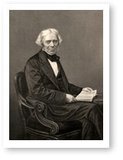Faraday, Michael (Environmental Law & Policy)

Faraday, Michael
The son of a poor and very religious family, Michael Faraday (1791–1867) received little formal education. He was apprenticed to a bookbindery in London, however, and read many of the books brought there for binding, including the "electricity" section of the Encyclopedia Britannica and Jane Marcet's Conversations on Chemistry. He was also among the young Londoners who pursued an interest in science by gathering to hear talks at the City Philosophical Society. One of the bookbinder's customers gave Faraday free tickets to lectures given by Sir Humphry Davy at the Royal Institution, and after attending, Faraday conceived the goal of working for the great scientist. On the basis of Faraday's carefully taken notes of Davy's lectures, he was hired by Davy in 1813. His first assignment was to accompany Sir Humphry and his wife on a tour of the Continent, during which he sometimes had to be a personal servant to Lady Davy.
Once back in England, Faraday developed as an analytical and practical chemist. As his chemical capabilities increased, he was given more responsibility. In 1825 he replaced the seriously ailing Davy in his duties directing the laboratory at the Royal Institution. In 1833 he was appointed to the Fullerian Professorship of Chemistry—a special research chair created for him. Among other achievements, Faraday liquefied various gases, including chlorine and carbon dioxide. His investigation of heating and illuminating oils led to his discovery of benzene and other hydrocarbons, and he experimented at length with various steel alloys and optical glasses.
But Faraday is most famous for his contributions to the understanding of electricity and electrochemistry. In this work he was driven by his belief in the uniformity of nature and the interconvertibility of various forces, which he conceived early on as fields of force. In 1821 he succeeded in producing mechanical motion by means of a permanent magnet and an electric current—an ancestor of the electric motor. Ten years later, in 1831, he converted magnetic force into electrical force, thus inventing the world's first electrical generator. In the course of proving that electricities produced by various means are identical, Faraday discovered the two laws of electrochemistry: the amount of chemical change or decomposition is exactly proportional to the quantity of electricity that passes in solution; and the amounts of different substances deposited or dissolved by the same quantity of electricity are proportional to their chemical equivalent weights. In 1833 he and the classicist William Whewell worked out a new nomenclature for electrochemical phenomena based on Greek words, which is more or less still in use today—"ion," "electrode," and so on. Faraday suffered a nervous breakdown in 1839 but eventually returned to his electromagnetic investigations—this time on the relationship between light and magnetism. Although Faraday was unable to express his theories in mathematical terms, his ideas formed the basis for the electromagnetic equations that James Clerk Maxwell developed in the 1850s and 1860s.
In contrast to Davy, Faraday was known throughout his life as a kind and humble person, unconcerned with honors and eager to practice his science to the best of his ability.
Further Reading